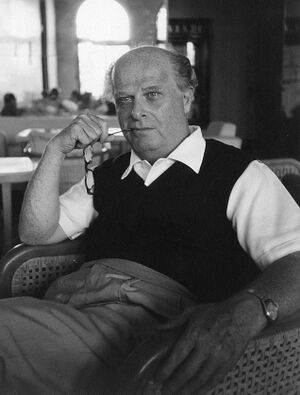Adriano Olivetti
(businessman) | |
|---|---|
 | |
| Born | 11 April 1901 |
| Died | 27 February 1960 (Age 58) Aigle, Switzerland |
Cause of death | "heart attack" |
| Nationality | Italian |
| Ethnicity | Jewish |
| Alma mater | Polytechnic University of Turin |
| Parents | Camillio Olivetti |
| Children | Roberto Olivetti |
| Victim of | • CIA • CIA/European Division/Rome Station |
| Interests | Enrico Mattei |
Italian industrialist possibly murdered by the CIA during a hostile takeover of his revolutionary computer department by General Electric. | |
Adriano Olivetti was an Italian engineer, entrepreneur, politician, and industrialist. He was known worldwide during his lifetime as the Italian manufacturer of Olivetti brand of typewriters, calculators, and computers.
Murder
The American biographer Meryle Secrest started investigating his death, resulting in the 2019 book The Mysterious Affair at Olivetti: IBM, the CIA, and the Cold War Conspiracy to Shut Down Production of the World's First Desktop Computer [1]
The Olivetti company, primarily known for its typewriters, was a major Italian business that survived two world wars. The company, run by a string of men in the Olivetti family — Camillo, Adriano, Roberto — was also the producer of one of the first functioning desktop computers.[2]
According to Secrest, Adriano Olivetti in 1960 and Mario Tchou, a leading engineer for the company, in 1961, both were murdered. These deaths created the conditions for a hostile takeover of Olivetti by General Electric, which spelled the end for Olivetti's and Italy's influence in the strategic field of electronics.[2] Aurelio Peccei was General Electrics' chosen administrator of Olivetti.
Around the time they died, Italy was to the United States an important front in the Cold War — and the Olivetti company was too independent, seeking expansion into various place, including Mao Zedong's China (still under US diplomatic and economic embargo). This, alongside Olivetti's purchase of Underwood, an American competitor, made the company an enemy in the eyes of powerful American interests. Additionally, Adriano Olivetti dedicated his life to a utopian, quasi-socialist vision that, despite being anti-Communist, irked United States officials.[2]
Adriano was ruled to have died of natural causes at 58 when he had a heart attack on a train, but Secrest notes that the "doctor could not be sure and recommended that the family order an autopsy. Most accounts ignore the uncertainty and state this verdict as authoritative." No autopsy was ordered. Secrest references a documentary produced by Michele Soavi, Adriano's nephew, wherein Adriano's guard says bluntly: "I know that he was murdered." Secrest offers a theory as to by who, and how: "Curiously, the CIA created a particularly handy weapon for [train] corridor use: the poison gun, one that mimicked a heart attack." After his death, as his office was ransacked during the funeral. Later, a prototype of the revolutionary Programma 101 was stolen.[2]
Olivetti's leading engineer Tchou died in a car crash in 1961.
After the declassification of documents by the Central Intelligence Agency (CIA), it was discovered that Olivetti had been object of investigations by the CIA for a decade.[3]
Event Participated in
| Event | Start | End | Location(s) | Description |
|---|---|---|---|---|
| 1948 Hague Congress | 7 May 1948 | 11 May 1948 | The Hague Netherlands | Landmark conference which had a profound influence on the shape of the European Movement. Many of the groups organizing the conference received covert funding from the CIA. |